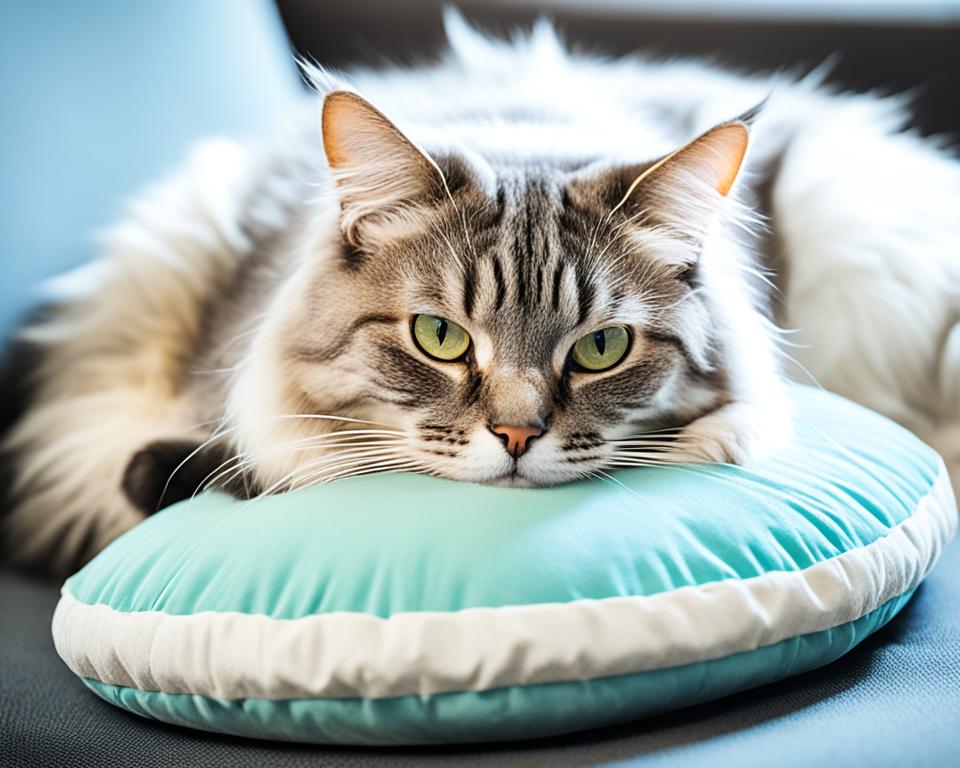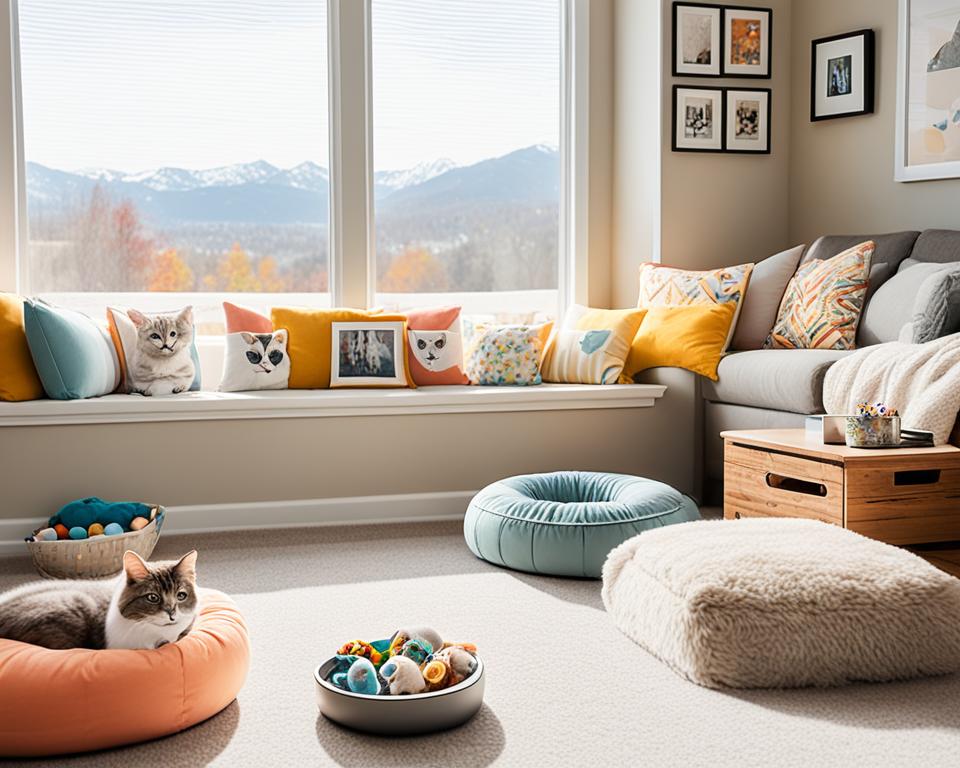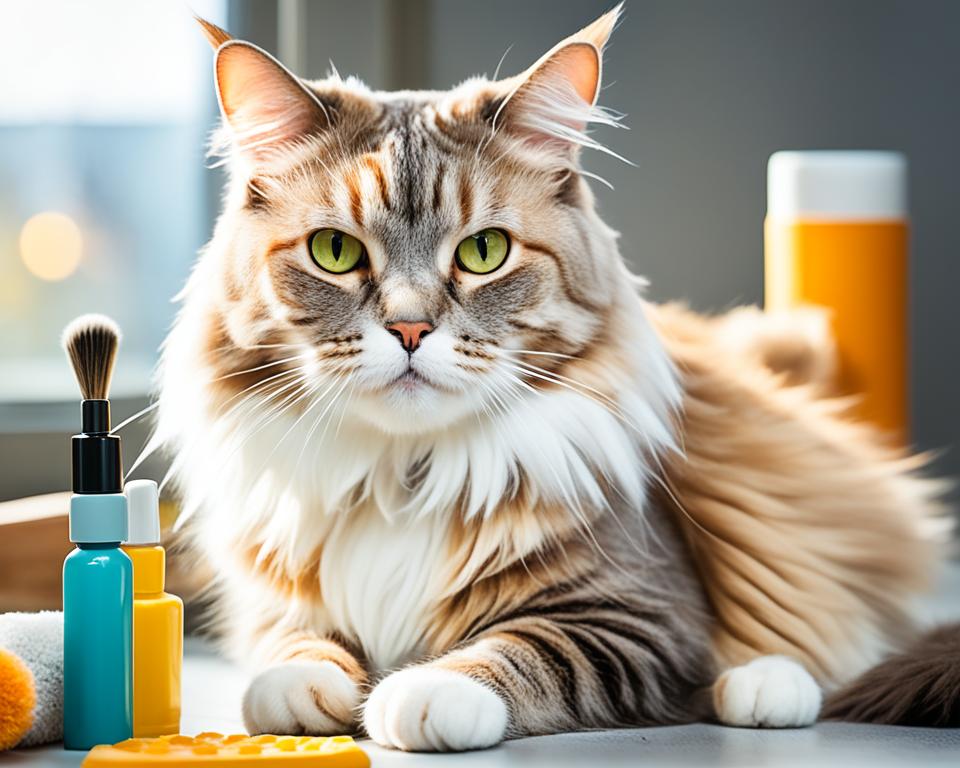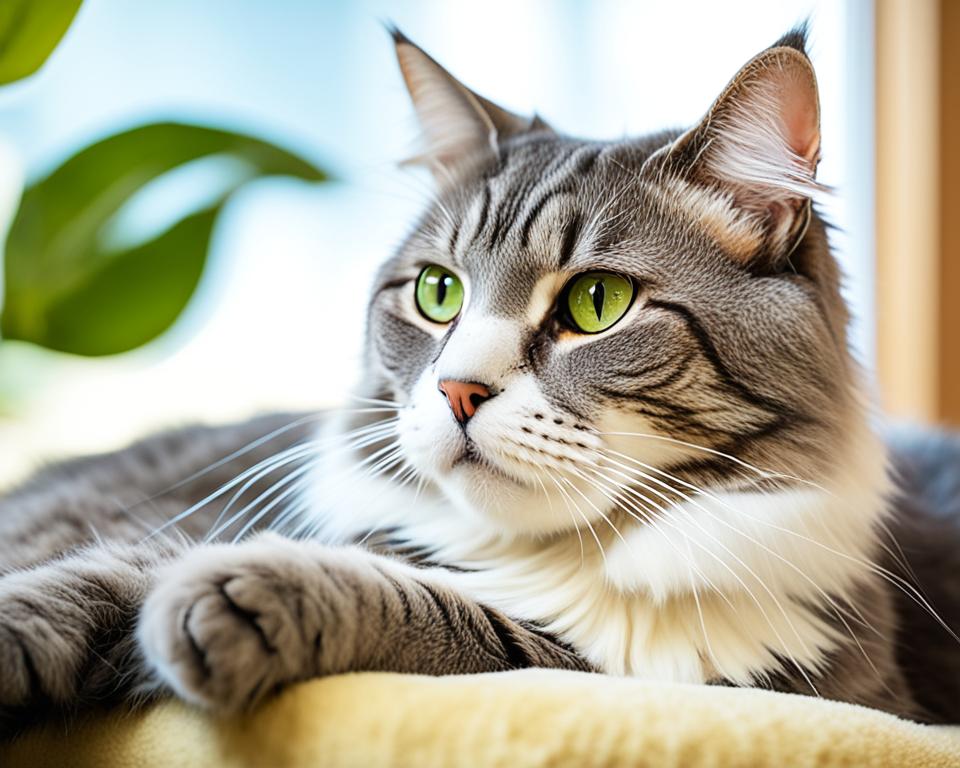As a cat owner, I’ve learned a lot about caring for older cats. Cats are living longer thanks to better food and vet care. Now, it’s common for cats to live into their twenties.
Senior cat care has changed a lot. We used to think cats were seniors at eight years old. Now, we consider 12 to 14 years old the start of their golden years. Some cats even live up to 22 years old.
Caring for older cats means paying close attention to them. I’ve seen my older cat’s activity and eating habits change. It’s important to change their living space and food to fit their needs. Regular vet visits are also key to keeping them healthy.
In this guide, I’ll share tips for caring for your senior cat. We’ll talk about nutrition, comfort, and how to keep your aging cat happy and healthy.
Understanding the Changing Needs of Your Senior Cat

Caring for a senior cat is special. Let’s look at what aging cats need and how we can help them stay healthy and happy.
When is a cat considered senior?
Cats become seniors between 7 to 10 years old. This is when they start needing more care and attention.
Common age-related changes in cats
Senior cats change in how they sleep, eat, and have energy. They sleep a lot but still need to stay active. My older cat has joint pain and meows more at night.
- Altered sleep-wake cycles
- Decreased kidney function
- Changes in vision and hearing
- Weight fluctuations
- Difficulty grooming
The importance of regular veterinary check-ups
The American Association of Feline Practitioners suggests seeing the vet every six months for seniors. These visits help catch health problems early. A typical visit includes:
| Examination | Tests |
|---|---|
| Weight check | Blood work |
| Skin and coat inspection | Urinalysis |
| Oral health assessment | Blood pressure check |
| Joint mobility evaluation | Feline leukemia/FIV status |
By understanding and meeting our cats’ changing needs, we can make their senior years good. Regular vet visits, good food, and lots of love help with their health and behavior.
Senior Cat Care: Nutrition and Hydration
As our feline friends age, their nutritional needs change. Proper senior cat nutrition is key to keeping our elderly cats healthy and happy. Let’s explore how we can meet the aging cats’ needs through diet and hydration.
Adjusting Your Cat’s Diet for Optimal Health
Cats over 10 years old are considered seniors. At this stage, their dietary requirements shift. Reducing calorie intake by 20% to 25% can slow age-related changes and even increase lifespan. For older seniors, increasing calories and protein might be necessary to maintain weight.
Increasing Water Intake for Aging Felines
Water is crucial for senior cats, especially as their thirst sensitivity decreases with age. To boost hydration, I place multiple water sources around the house and mix wet food with dry kibble. This helps prevent dehydration and supports kidney function in aging cats.
The Benefits of Smaller, More Frequent Meals
Portion feeding is ideal for senior cats. It helps control calorie intake and makes it easier to spot changes in appetite. I’ve switched to serving smaller meals more often throughout the day. This approach aids digestion and maintains steady energy levels for my elderly cat.
| Age Group | Calorie Needs | Feeding Strategy |
|---|---|---|
| 7-11 years | Reduced calories | Portion control |
| 11+ years | Increased calories and protein | Smaller, frequent meals |
| All seniors | Varies by individual | Consult vet for tailored diet |
Remember, each cat is unique. It’s best to consult with a veterinarian to create a nutrition plan that meets your senior cat’s specific needs. With the right diet and care, we can help our aging feline companions enjoy their golden years to the fullest.
Creating a Comfortable Environment for Your Aging Cat

As our feline friends get older, they need special care. Making our homes senior cat-friendly is key. Let’s see how to make life better for our aging cats.
First, think about making things easy to reach. I put food, water, and litter boxes on every floor. This helps cats move around better. For high spots, I use ramps or steps. These small changes make a big difference for elderly cats.
Lighting is also crucial. I use nightlights to help cats see better at night. For sleeping, I offer many spots with special beds. These beds help with joint pain in older cats.
Keeping things the same helps cats with memory loss. I keep my home stable to reduce stress. For litter boxes, I pick ones with low sides for easy use.
| Area | Adaptation | Benefit |
|---|---|---|
| Sleeping | Orthopedic beds | Joint relief |
| Mobility | Ramps and steps | Easy access to favorite spots |
| Lighting | Nightlights | Improved navigation |
| Litter boxes | Low sides | Easy entry and exit |
These changes can really help your senior cat live better. By meeting their needs, we make sure they stay happy and comfortable as they age.
Maintaining Physical and Mental Health in Senior Cats

As our feline friends age, their needs change. Most cats start showing age-related changes by 12 years old. It’s key to adjust our care to keep them healthy and happy.
Gentle grooming techniques for older cats
Senior cat grooming is vital as they age. Their skin gets thinner and less stretchy. Daily grooming helps keep their coat healthy and spots skin issues early. It also makes them feel loved, which is good for their behavior.
Encouraging play and mental stimulation
Keeping senior cats mentally sharp is important. I bring in new toys and games to keep them interested. Catnip is a great way to get them to play. Short play times help keep their minds and bodies strong.
Managing pain and mobility issues
Senior cats often have arthritis. Up to 9 out of 10 show signs of it when X-rayed. I watch for signs of pain and less movement. If I see changes, I talk to my vet about pain relief options. A cozy spot for resting also makes them feel better.
Regular vet visits are key for catching health issues early. Blood tests can find kidney disease, common in older cats. By watching my cat’s weight and being alert, I can catch health changes early. With the right care, our cats can enjoy their golden years fully.
Addressing Common Health Concerns in Older Cats
As our feline friends age, they face unique health challenges. Cats are considered senior at 9 years old, which is about two-thirds of their average life expectancy. This milestone marks the onset of various senior cat health issues that require our attention and care.
Dental disease is a big concern, affecting 50 to 90% of cats over 4 years old. Regular dental check-ups and cleanings can prevent more serious problems down the line. Another common issue is hyperthyroidism, which can cause increased appetite and energy levels in older cats.
Chronic kidney disease (CKD) is a big worry for aging felines. I always recommend routine blood panels to detect early signs of CKD or other metabolic disorders. Weight management is crucial too, as obesity can lead to diabetes, especially in indoor cats with sedentary lifestyles.
| Health Issue | Prevalence in Senior Cats | Key Signs |
|---|---|---|
| Dental Disease | 50-90% of cats over 4 years | Bad breath, difficulty eating |
| Arthritis | 90% of cats over 12 years | Stiffness, reduced activity |
| Cancer | 30% of cats over 10 years | Lumps, weight loss, lethargy |
For cats nearing the end of their lives, end-of-life cat care becomes a priority. This might include hospice care for cats with terminal conditions. It’s essential to maintain open communication with your vet about quality of life and treatment options. Remember, our aging feline companions rely on us for comfort and support during their golden years.
The Importance of Love and Attention in Senior Cat Care
Looking after aging cats, I’ve seen how important love and attention are. Elderly cats often want more company. They may meow more to ask for attention. It’s sweet when my senior cat follows me or rubs against my legs.
With aging cats, their behavior changes. Some get more distant, while others want more company. I make sure to spend quality time with my senior cat. This includes gentle petting and sitting together. It helps us bond and keeps them happy.
Keeping a calm home is vital for senior cats. They can feel more insecure as they age. So, I’ve made my home more comfortable and easy for them. I also play with them using toys that are right for their age. This keeps them active and sharp.

